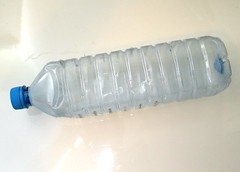
![]() Photo credit: How can I recycle this
Photo credit: How can I recycle this
By now, most people have now heard of BPA (or bisphenol-A), the chemical found in polycarbonate plastics. BPA is most often founds in clear, hard plastic water bottles, food containers and baby bottles (when in doubt, BPA is found in number 7 plastics). As of April 2008, BPA has received considerable press attention for health and safety concerns. Canada is the first country to ban the import of baby bottles that contain BPA. Furthermore, in October of last year, the Canadian federal government added BPA to its list of toxic substances.
The reason? BPA mimics the hormone estrogen. Over the years, estrogens and estrogen mimickers are becoming increasingly prevalent in our society. Common causes include dairy and meat growth hormones, hormones from birth control pills being released into the water supply and polycarbonate plastics. Even certain foods, such as soy, can mimic human estrogen, causing a rise in hormone levels in the body. Harmful to both men and women, BPA exposure has been linked to insulin resistance, obesity and infertility. BPA has also been linked to abnormal growth in breast, uterine, ovarian and prostate cells, which may lead to cancer. Infants are especially sensitive to such chemicals, explaining the ban on BPA baby bottles. The plastic industry, of course, denies such claims.
However, even those who support the use of BPA explain that plastics made from BPA should be used carefully. For example, they should not be frozen or heated at high temperatures. This is extremely difficult, though, when infant bottles are meant to have milk heated inside them. Also, may people bring their plastic water bottles on a hot day, or leave them in a hot car. These actions further the release of the toxins into the water, to be ingested.
Although the recent concern over BPA is due to safety concerns for humans, the chemical is also dangerous to the ecosystem. An environmental pollutant, BPA is also harmful to the reproductive systems of fish and other marine life. Indirectly, plastics are well known to stay in landfills for hundreds of years or pollute oceans.
Since the media spotlight on BPA, some companies have made wonderful changes. On the other hand, many big-name brands haven’t done much. Perhaps the most remarkable change is the opportunity for small companies that catered to (previously) niche markets of stainless steel and glass products to become mainstream. Still, the hype for “BPA free†everything has resulted in confusion over what “BPA free†truly means.
Water Bottles
The most BPA confusion has resulted from the water bottle industry. Since 2008, companies such as Mountain Co-op and Lululemon voluntarily removed water bottles containing BPA. Retailers like Starbucks, however, continue to sell number 7 plastic containers for hot and cold beverages.
As far as plastic alternatives go, not all metal bottles are created equal. Aluminum bottles (such as SIGG) may be lightweight, but they are always coated with a thin plastic layer. There is much controversy regarding how safe the plastic lining is, and whether it may contain trace amounts of toxins.
To avoid these controversial plastics, choose bottles made from 100% food grade stainless steel with no plastic lining. Stainless steel is non-toxic, durable, easy to clean and does not rust. Also, make sure that the plastic used for the lid is BPA free. Good examples include Klean Kanteen, Green Bottle, Purica and Bilt.
Tin Cans
Many people don’t know that the lining of tin cans contain BPA. However, since most people use tin cans more often than water bottles, they’re more of a concern than previously thought. As well, most food is heated at extremely high temperatures before being packed in cans, increasing their BPA content. There are very few brands of canned products that are not lined with BPA. Over the past year, many companies has expressed interest in using BPA free cans, but have not made the switch yet.
Eden Organics has been producing BPA-free canned products since 1999. Instead, they line their cans with “Oleoresinâ€, an expensive but naturally-derived oil and a resin mixture. Their line includes delicious canned beans, tomatoes, rice, lentils and chili.
For other BPA free alternatives, opt for dried soup mixes, and products such as pasta sauces in glass bottles. When cans are unavoidable, refrain from heating the cans and use the product as soon as possible, since the lining leaches more BPA over time. Keep in mind that BPA breaks down and leaches into food faster in the presence of fatty foods like fish, and acidic foods like tomatoes.
Food Storage
Replacing Tupperware with BPA free alternatives has never been easier. Preserve brand plastic food storage containers are made from recycled number 5 plastic, and come in a wide variety of shapes and sizes. Of course, Pyrex glassware is a dependable staple for food storage and cooking.
Baby Bottles
There have been substantial gains in the baby bottle industry. As mentioned, baby bottles that contain BPA were banned in Canada. The company Born Free offers glass bottles that are growing in popularity. For those who prefer plastic bottles that have less chance of breaking, Green to Grow bottles are made from recycled material, dishwasher safe and BPA lead, phthalate and PVC free. Still, there is a long way to go, since many “BPA free†plastic baby bottles were recently found to contain trace amounts of the chemical.
Thus, the past year has opened up a lot of discussion in the BPA debate, and no doubt there is much more on the way. I appreciate any discussion on the topic, whether you agree or disagree, or if you know of more bisphenol-A alternatives I haven’t mentioned. Â
Recommended Comments
Join the conversation
You can post now and register later. If you have an account, sign in now to post with your account.